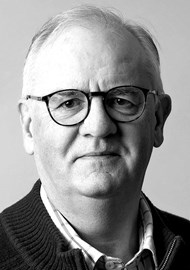A new Labour Government won a landslide election victory on 4 July this year. Much to his surprise, Norwich ENT surgeon Peter Prinsley was elected as the Labour MP (Member of Parliament) for Bury St Edmunds and Stowmarket in Suffolk. Peter is a passionate advocate for research and development, and we can be very proud we have a strong advocate in parliament for improved support for clinical advances.
Our former editor, Ray Clarke, caught up with Peter to chat about the challenges ahead.

First, warmest congratulations from the ORL community on your election, Peter. Tell me how it came about?
I have always had an interest in politics, and my uncle was a member of parliament for Goole in the old Yorkshire East Riding back in the 60s. More recently I was a ‘consort’ for my wife, Marian, during her tenure as the sheriff of Norwich. It was put to me that I could get involved in local politics, and after a few attempts I got elected to Norwich City Council – the first doctor in living memory on the council.
It was suggested that I try for a parliamentary seat so I went to get what is called ‘credentialled’, which means deemed suitable. I had what felt like an old-fashioned consultant interview in London, then I heard no more until May 2024 when a surprise election was called. I must have been one of a pool of potential candidates to be pressed into service whenever the election was called because, much to my surprise, I got a call from an official to say I had been selected as the candidate for Bury St Edmunds. When I thanked him he chuckled and explained that it was the third safest Conservative seat in England but that Labour was putting up candidates everywhere.
I went to Bury St Edmunds and met a wonderful group of indefatigable ladies who were my campaign team and told me we were going to try to win the seat! We embarked on a sort of ‘guerilla campaign’: bicycles, foot soldiers, an old post office van as a ‘Battle bus’ (pictured above) – with me in my scrubs on the side – and we toured the constituency. We were warmly greeted on doorsteps and many people told us they had never met a candidate before, so complacent was the local Conservative team that the seat was theirs in perpetuity.
Were you schooled in medical politics, and did this help?
I was regional director for the Royal College of Surgeons and programme director for trainees, so I had some experience in giving an account of myself in front of committees, which helped.
Are you still an active surgeon?
Yes, I am. I wasn’t exactly expecting to get elected so I have clinics and surgeries booked for the next few months, but the plan is to slow down and just do out-patient work in the parliamentary recess. I think that will help keep me grounded and in touch with patients. I will be conducting ‘clinics’ with my constituents, and there are lots of similarities in the sort of skills politicians and surgeons need. It is no accident that interactions between MPs and their constituents are called ‘surgeries’!
How many doctors are there in parliament?
I think we have 10, but surgeons are very rare indeed in parliament, and I think I am the first ENT surgeon.
How is this going to impact on your life – will you move to London?
The plan is to rent a small flat near the House of Commons, so we will live between London and home. I hope to get to the odd ORL meeting, perhaps the Royal Society of Medicine, and don’t want to lose touch with my first love, ENT.
I haven’t a specific parliamentary role yet but hope to get involved in committees relating to health, the NHS and the rural economy in Suffolk.
The last question that I wanted to ask Peter was the most urgent: ‘What about the NHS? Is it safe?’ I put it to Peter that there is much despondency about the health service, but he doesn’t share such a pessimistic view. In his maiden speech he pointed out that the pace of change in medicine is relentless, using as examples that when the NHS first started, the treatment for arthritis of the hip was a walking stick, and for cataracts it was thick-lensed glasses. Now we expect hip replacements and cataract surgery as a routine and as a right, when in truth they are surgical miracles. And there is more to come. So, in answer to the question, is there hope for the future of the NHS? An emphatic “yes!”





